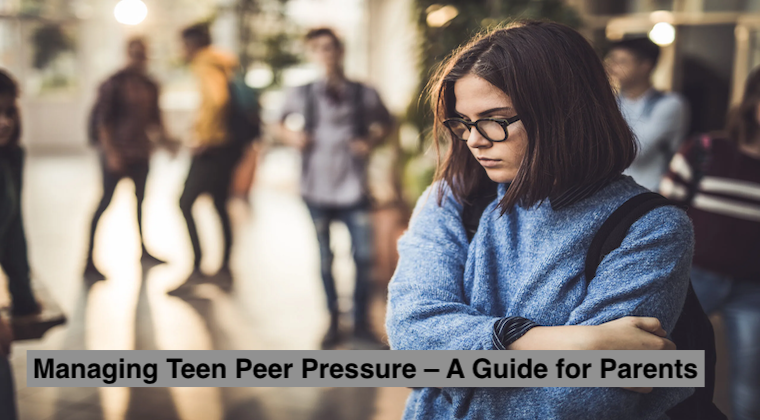+1 845 259 2974 (11 a.m to 7 p.m CST)
Managing Teen Peer Pressure – A Guide for Parents

Teen peer pressure is a common challenge that many parents face. As children grow, their friends and social circles heavily influence them. While this is a natural part of growing up, it can also lead to difficult situations. As a parent, your guidance is crucial in helping your teen navigate these pressures. Let’s understand peer pressure, how to spot it, and how to support your teen in making the right choices.
What is Peer Pressure?
Peer pressure is the influence that a group of friends or acquaintances exerts on an individual to behave in a certain way. This influence can be either positive or negative.
- Positive Peer Pressure: Encourages good behaviors, such as joining a club or studying harder.
- Negative Peer Pressure: Leads to risky behaviors like drinking, smoking, or skipping school.
Teens encounter peer pressure from various sources, including friends, classmates, and social media. Understanding these different sources and types of peer pressure is essential for parents to provide the right support.
Spotting Peer Pressure in Your Teen
It’s not always easy to tell when your teen is under peer pressure, but there are signs you can watch for. Behavioral changes are often the first indicators. Your teen might become more secretive, defiant, or start acting out in ways that are out of character.
Common Signs of Peer Pressure:
Behavioral Changes:
- Increased secrecy or defiance
- Changes in mood, such as irritability or withdrawal
Signs of Stress or Anxiety:
- Unusual quietness or restlessness
- Trouble sleeping or changes in appetite
Shifts in Friendships:
- Sudden changes in their social circle
- Abandoning long-time friends for new, potentially harmful ones
Being aware of these signs can help you step in before the pressure becomes too much.
Effects of Peer Pressure on Teens
Peer pressure can significantly impact a teen’s emotional and mental health. The constant need to fit in can lead to high levels of stress and anxiety. This pressure can also damage their self-esteem, especially if they feel they must compromise their values to be accepted by their peers.
Emotional and Mental Health:
- Feeling the need to conform can cause significant stress.
- Constant pressure to fit in can harm their sense of self-worth.
- Peer pressure often influences decision-making, pushing teens toward risky behaviors they might not engage in otherwise. This can include experimenting with drugs, alcohol, or engaging in dangerous activities. Academically, peer pressure can lead to poor choices, such as skipping school or neglecting studies.
Influence on Decision-Making:
Risk-Taking Behaviors:
- Experimenting with drugs or alcohol
- Engaging in dangerous activities
Poor Academic Choices:
- Skipping school
- Neglecting studies
Over time, these experiences can have lasting consequences. The pressure to conform can negatively shape your teen’s identity and sense of self-worth, leading to long-term effects on their confidence and emotional well-being.
How Parents Can Help
As a parent, your role in helping your teen manage peer pressure is vital. One of the most effective ways to do this is by maintaining open communication. Encourage your teen to talk about their experiences and feelings, and listen without judgment. Discussing peer pressure openly can help them feel understood and supported.
Open Communication:
Encourage Honest Conversations:
- Ask open-ended questions about their day.
- Listen without judgment to build trust.
Discuss Peer Pressure:
- Talk about the different forms of peer pressure.
- Share your own experiences with peer pressure.
Building your teen’s confidence is also crucial. Praise their achievements, big or small, and encourage them to pursue their interests and passions. This positive reinforcement helps them develop a strong sense of self, making it easier for them to resist negative peer pressure.
Building Confidence:
Praise Achievements:
- Celebrate both big and small wins.
- Encourage them to pursue their interests and passions.
Foster Independence:
- Allow them to make decisions.
- Support them in standing by their values.
Setting boundaries is another key step. Teach your teen how to say no and stand up for themselves, even when it’s difficult. Role-playing different scenarios where they might face peer pressure can prepare them to handle such situations confidently.
Setting Boundaries:
Teach Them to Say No:
- Role-play scenarios where they might face peer pressure.
- Reinforce that it’s okay to walk away from harmful situations.
Helping Teens Handle Peer Pressure
There are several practical strategies you can teach your teen to handle peer pressure effectively. Role-playing is a useful method that allows them to practice responses to common peer pressure situations. By simulating these scenarios, your teen will feel more prepared and confident in real-life situations.
Practical Strategies:
Role-Playing Scenarios:
- Practice responses to common peer pressure situations.
- Prepare them to handle pressure confidently.
Encourage Positive Friendships:
- Help them choose friends who respect their values.
- Discuss the importance of supportive relationships.
Develop Problem-Solving Skills:
- Teach them to weigh the consequences of their actions.
- Encourage thoughtful decision-making.
Encouraging positive friendships is also important. Help your teen understand the value of choosing friends who respect their values and support their decisions. Discuss the importance of surrounding themselves with people who have a positive influence on their lives.
Developing problem-solving skills is another way to empower your teen. Teach them to weigh the consequences of their actions and think critically before making decisions. This approach helps them to be more thoughtful and deliberate when faced with peer pressure.
Support from Schools and Communities
Schools and communities can play a significant role in helping teens manage peer pressure. A supportive school environment is crucial. Schools that promote a positive culture and offer programs on peer pressure can provide valuable resources for your teen.
School Support:
Positive School Culture:
- Encourage involvement in supportive school programs.
- Promote anti-bullying initiatives.
Peer Pressure Education:
- Advocate for school programs that teach about peer pressure.
Community programs and youth groups also offer support. These programs often provide safe spaces for teens to express themselves and connect with others who share their values. Encourage your teen to get involved in these activities, as they can offer additional support and a sense of belonging outside their immediate peer group.
Community Resources:
Youth Groups and Programs:
- Find local organizations that support teens.
- Encourage participation in community activities.
Safe Spaces:
- Identify places where your teen can express themselves freely.
- Connect them with mentors or counselors if needed.
Knowing When to Get Help
Sometimes, peer pressure can become too much for a teen to handle alone. As a parent, it’s important to recognize when your teen might need extra help. If your teen seems constantly stressed, anxious, or if their behavior changes drastically, it may be time to seek professional support.
Recognizing the Need for Professional Support:
Signs of Overwhelming Pressure:
- If your teen seems constantly stressed or anxious.
- If there are drastic changes in behavior or mood.
Seeking Professional Help:
- Consult a counselor or psychologist.
- Provide your teen with additional tools and coping strategies.
A counselor or psychologist can provide additional guidance and help your teen develop coping strategies. Don’t hesitate to reach out if you feel your teen needs more support. It’s better to seek help early before the situation escalates.
Managing teen peer pressure is challenging, but with the right approach, parents can help their teens make the right choices. By staying connected with your teen, encouraging open communication, and teaching them to handle pressure confidently, you can guide them through these difficult situations.























